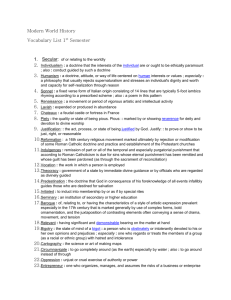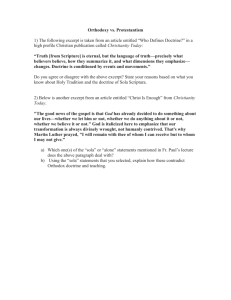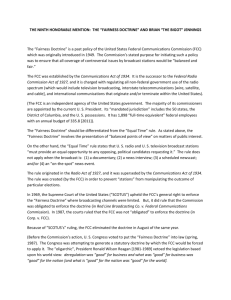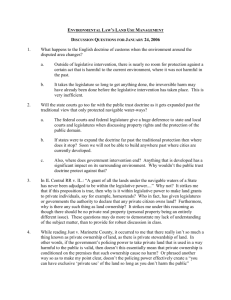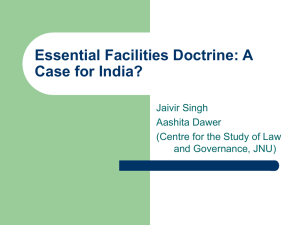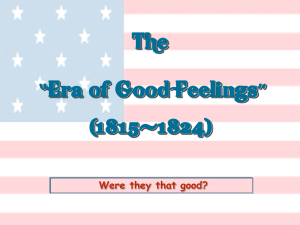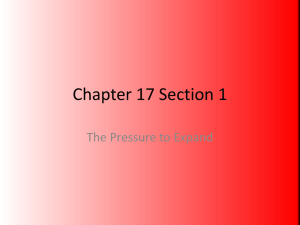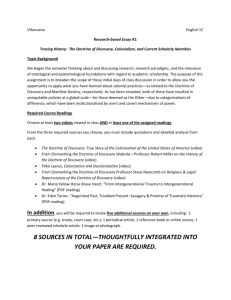James Brenner - Politics and Government| Illinois State
advertisement
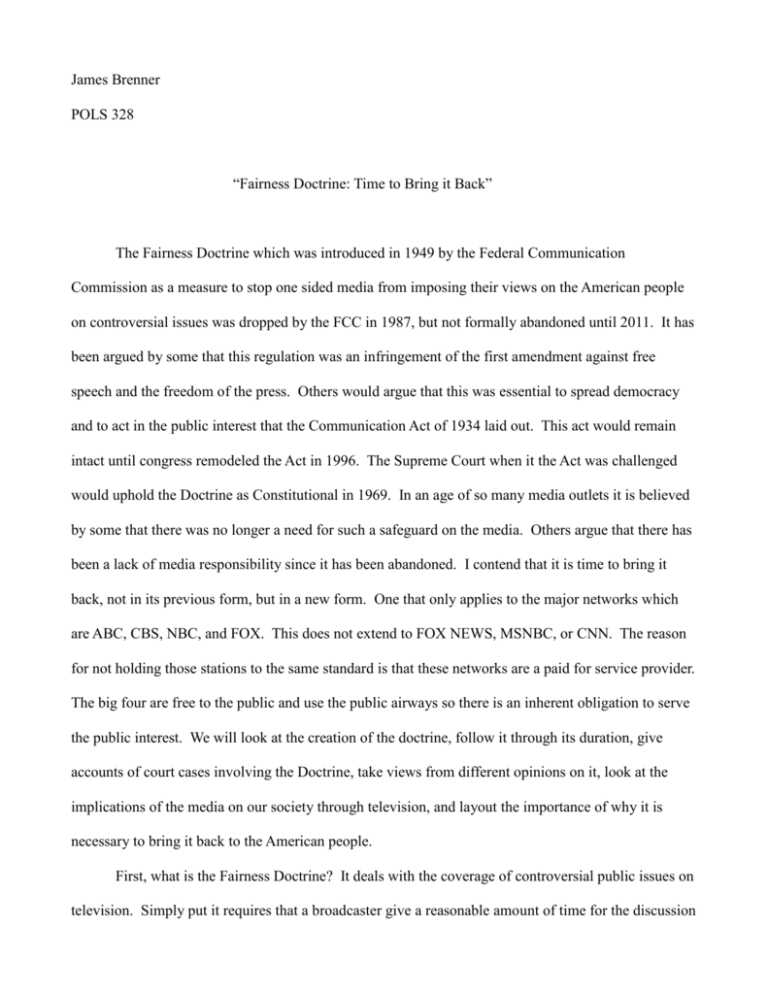
James Brenner POLS 328 “Fairness Doctrine: Time to Bring it Back” The Fairness Doctrine which was introduced in 1949 by the Federal Communication Commission as a measure to stop one sided media from imposing their views on the American people on controversial issues was dropped by the FCC in 1987, but not formally abandoned until 2011. It has been argued by some that this regulation was an infringement of the first amendment against free speech and the freedom of the press. Others would argue that this was essential to spread democracy and to act in the public interest that the Communication Act of 1934 laid out. This act would remain intact until congress remodeled the Act in 1996. The Supreme Court when it the Act was challenged would uphold the Doctrine as Constitutional in 1969. In an age of so many media outlets it is believed by some that there was no longer a need for such a safeguard on the media. Others argue that there has been a lack of media responsibility since it has been abandoned. I contend that it is time to bring it back, not in its previous form, but in a new form. One that only applies to the major networks which are ABC, CBS, NBC, and FOX. This does not extend to FOX NEWS, MSNBC, or CNN. The reason for not holding those stations to the same standard is that these networks are a paid for service provider. The big four are free to the public and use the public airways so there is an inherent obligation to serve the public interest. We will look at the creation of the doctrine, follow it through its duration, give accounts of court cases involving the Doctrine, take views from different opinions on it, look at the implications of the media on our society through television, and layout the importance of why it is necessary to bring it back to the American people. First, what is the Fairness Doctrine? It deals with the coverage of controversial public issues on television. Simply put it requires that a broadcaster give a reasonable amount of time for the discussion of an issue and if he reports on an issue of controversy that he give the opposing view of that issue. For example if ABC were to do a piece on the dangers of a woman having health problems due to pregnancy and suggesting it necessary to have an abortion to save her life. That station would have to present on opposing viewpoint that may argue that at seven months it is possible to remove the child and place it in an incubator at three pounds till it was healthy enough to breathe on its own. This would address both sides of the Pro-file and Pro-choice argument. The Doctrine does not require the broadcaster to even present both views in a single broadcast, or even in the same series of broadcasting, provided that it is presented somewhere in its overall programming. So if Nightline on ABC were doing this story on the dangers of pregnancy on the woman and suggesting that it was necessary to abort the child to save her live, then as long as ABC would give the opposing view not on Nightline, but during the morning news this would satisfy their obligation to the people and the FCC.” The Licensee is given its own discretion to choose what issues it wants to air, the program formats to be used, and the persons who will be presenting the contrasting views. The commission will review the license’s decision only to decide if they were reasonable and made in good faith” (Fowler 69). Does this seem like an unreasonable requirement for a television station that uses the public airways to have to abide by? After all these are our airways. We own them; the broadcaster just leases them from us. Is it too much to expect that as owners of this property that we can get both sides on an important issue so that we can be better informed on that topic as a society? There are detractors who argue that in today’s society we can just go to the internet and find the opposing view if we want to. The problem with that narrow minded thinking is that people often believe what they see and hear as the truth. I will go into the psychological implications later. Having only one view constantly thrown at you is not much different all be it different circumstances than that of Nazi Germany propaganda. We all know how that turned out. “The will of the people in periods between elections is expressed through a process of organizing support behind one of the conflicting viewpoints offering solutions to a public problem.” (Ripley 2) “Only the media of mass communications are capable of effectively communicating information to the general public.” (Ripley 3) What this means is that the only source that has the ability to influence public opinion is the mass media and with that they shoulder a huge responsibility, or at least they used to. What are the constitutional issues regarding the Doctrine? Should the Federal Government be allowed to regulate what broadcasters can say about a topic? I believe that the government should not be able to tell broadcasters what they can say, but only that they require them to give opposing views on the subject matter. Someone can say what they want to as to not limit their free speech, but also give another person the same opportunity to refute that opinion. By not allowing the other viewpoint is essentially silencing or limiting the speech of someone else. Rowan contends that “the requirement of a broadcaster to provide contrasting viewpoints on controversial issues is a limitation on the broadcaster’s first amendment right to select what he or she wants to present on a station.” (Rowan 15) This does not infringe on their first amendment right because the broadcaster does not have to air anything it does not want to. It simply requires them to act in the public interest and not their ideological beliefs. He also claims that “the first amendment was devised so that those who wished to speak about political affairs would be shielded from government harassment and punishment for their views.” (Rowan 15) In my lifetime I can't recall anyone going to jail for expressing their opinion on any such issue. The only exception would be if someone was to go on the air and give classified information that would be detrimental to National Security. He goes further to say that “the first amendment rest on the assumption that the that the widest possible dissemination of information from diverse and antagonistic sources is essential to the welfare of the public and permitting every speaker to state his or ideas will help the public adopt those which are correct and worthy.” (Rowan 15) It is his belief that the imposition is a form of censorship. I vehemently argue that the lack of conflicting viewpoints is of greater harm to society. By not allowing the viewpoint on an issue is censoring the view of the opposition. Also the founding fathers could not have envisioned television as a form of media. This is not the printing press. This is a source that has the potential to reach millions of viewers in a single broadcast. The government is not harassing, punishing, or limiting the view of anyone with this policy. All it is doing is making sure that there is a marketplace of opposing views. After all is not what freedom and democracy are founded on. The ability of us as citizens to express our views whether popular or not. Given both sides we are free to believe which is right or wrong. All the FCC does if a station is not in compliance is fine them and if there was repeated neglect then the possibility of not renewing their license. In 1969 the Supreme Court heard a case that was brought before them regarding the Constitutionality of the Doctrine. As a requirement of renewing a stations license was complying with its regulations regarding time given to both sides of controversial viewpoints. Red Lion Broadcasting Company brought suit against the Federal Communication Commission for failure to renew its license. Red Lion contended that by not renewing their license for not complying with the Doctrine that it violated their first amendment right to freedom of the press. The court in a unanimous ruled in favor of the FCC. Delivering the opinion of the Court Justice White said “spectrum scarcity made it idle to posit an unbridgeable first amendment right to broadcast comparable to the right of every individual to speak, write, or publish. The Court reasoned that the rules of the Doctrine enhanced rather than infringed on the first amendment freedom of speech.” (Oyez) Simply put that by keeping an opposing view of a controversial issue out of reach from the public this is a greater limitation of free speech than the broadcaster’s ability to present a topic with a one sided view. How were complaints handled by the FCC? First any citizen who feels that the broadcaster has not given the opposing side of a particular issue a fair shake can file a complaint with the commission. In 1980 21,563 fairness doctrine complaints were filed before the FCC. Many came during the election campaign and fell under the equal time rule. The equal time rule is different than the Fairness Doctrine it states that each candidate must be given equal time on the airways. Many Americans confused the two different policies. This left only 10,301 that were left open to scrutiny of the FCC under the Doctrine. Of these 10,301 only 28 actually warranted the FCC to ask the broadcasters to respond to those complaints and of those 28 only 6 were found to be in direct violation of the Doctrine. Does this seem like the broadcasters were being unfairly punished by the FCC. Six incidents over the course of a single year are minimal in my opinion. The biggest reason for so many complaints that were filed was due to a misunderstanding by the public of the Doctrine and filing a complaint simply because they were angry about what was being reported. Other who filed complaints was interest groups who wanted their viewpoint put on the air and politicians who wanted to get publicity. (Rowan 51) Most of these complaints came in the form of phone calls. The biggest problem with this is that to make a formal complaint is that it has to be done in writing. The FCC does not police the airways and it does not initiate an investigation. They only respond to a formal complaint brought to them by the people. This is by no means a Gestapo organization. There are certain things that must be addressed to file a proper complaint. 1) The name of the station involved. 2) The controversial issue of public interest on which the view was presented. 3) The date and time of the broadcast. 4) The basis for the claim that the issue is controversial. 5) An accurate summary of the view broadcast. 6) The basis for the claim that the station has not broadcast contrasting views on the issue in its overall programming, and whether the station has afforded or has expressed the intention to afford, a reasonable opportunity for the presentation of contrasting viewpoints on that issue. The reason for so few final findings is that there is such a precise procedure that has to be followed that most people do not follow through all the way or they simply do not submit all of the required information for the FCC to move forward and look into the issue that was raised. With so few violations over the course of the Doctrine it is apparent that the broadcasters were for the most part following the spirit of the Doctrine. As citizens most of us do not know all of the laws so it is understandable that we would not know the procedure to follow in order to file a proper complaint. My idea for this to be more affective is that once you bring a complaint to the FCC. They should then send you a complaint form in the mail with instructions on how to fill it out. Today with computers so relevant how hard or expensive would it be to send this by email to a citizen that wanted to file a complaint. Some notable cases that were brought against broadcasters by interest groups were in 1975 when the National Organization of Women challenged the renewal of a networks license base on the notion that the station was airing programming that put women in stereotypical roles on numerous programs. These labels were women as sex objects and being dependent on men. NOW contended that the station raised the important and controversial issue of the role of women in society. The FCC ruled against NOW claiming that the infractions must be rooted in the dialogue and discussion rather than the portrayal. (Simmons 152) Though NOW may have lost the case this does not mean that they did not win the war. They received national attention for this lawsuit and it could be argued that it help lead to the way that women are now portrayed on TV. An Alabama TV station received a complaint along the same lines when it was challenged about programs that showed tragic events that followed the purchase of handguns. The complaint claimed these shows brought up the issue of gun control. The FCC in similar fashion rebuffed the complaint citing many police drama show crimes involving guns and the complainant did not show the issue in an obvious and meaningful fashion. (Simmons 153) I am not proposing that non news shows be held to the same scrutiny that news programs should be. Shows like CSI or NCIS are fictional and it is completely understandable that they should not fall under the jurisdiction of the Fairness Doctrine. The 1962 California Gubernatorial election brought some attention before the FCC. A program called Messrs was aired during a regular scheduled time during the show that saw Duggan and Putnam take repeated jabs at Governor Brown while making no negative remarks about the former VicePresident Richard Nixon. The Times Mirror Broadcasting Company was charged by the FCC for a violation. “The commission said when a broadcast station permits over its stations facilities, a commentator or any person other than a candidate to take a partisan position on the issue involved in a race for political office or to attack one candidate or support another by direct or indirect identification then it should send a transcript of the pertinent information so that the candidate or spokesperson can respond to the broadcast.” Kittross 126) I am not sure that I would include this in my version of a new Fairness Doctrine because the Supreme Court has ruled repeatedly that when you are in the public eye like athletes or politicians that this type of scrutiny comes with the territory. After all if I allowed this to part of the Doctrine then late night TV would not be able to make humorous parities about our politicians without going after someone on the other side. There is a very distinct difference between news and comedic sitcoms and there is no justifiable reason to treat both the same. In 1987 the FCC stopped enforcing the Doctrine, but it was not until 2011 that the Doctrine was completely removed from the books. “The FCC discarded this because; contrary to its purpose it failed to encourage the discussion of more controversial issues.” (Theirer) This did not go quietly into the night. The day that it was removed the FCC chairman said “the fairness doctrine has the potential to chill free speech and the free flow of ideas and was properly abandoned over two decades ago. I am pleased that we are removing these and other obsolete rules from our books.” (Thompson) Mr. Chairman must have forgotten that the Supreme Court voted unanimously that the Doctrine encouraged the free flow of ideas. In an interview on PBS Robert F. Kennedy Jr. had plenty to say regarding the elimination of the Doctrine. He said “the devolution of the American press began in 1986 when Ronald Reagan abolished the Fairness Doctrine. We had a law in this country that said the airways belong to the public.” (Thompson) He goes even further to state that “broadcasters can be licensed to use them, but only if they use them to promote the public interest, to inform the public, and advance democracy.” (Thompson) It seems to me that in this media conglomerate society with vast interest groups and corporate donors that the airways are no longer leased, but that they are owned by the corporations and no longer are used to advance democracy. Kennedy claims the reason that we have the 6 o'clock news today is because of the Fairness doctrine. He says the media companies did not want this programming because news programs are not money makers for the broadcast companies they in fact lost money for the broadcasters. He also says that the news on radio is indeed an artifact of the Fairness Doctrine. My proposal would not require radio stations to adhere to the Doctrine. It only applies to the big four networks as stated earlier. He gives his reasoning behind why the broadcasters don't serve in the public interest anymore. Their responsibility is to the shareholders and not to the public. He says that they serve that interest not by informing us, but by telling us the things we need to understand to make rational decisions in a democracy, but rather by entertaining us. This is what I refer to as newstainment. According to Kennedy we now have the most entertained, least informed, people on the face of the world. This I would disagree with Kennedy, maybe we are the most entertained in the world, but there are many other industrialized countries out there that have no form of free media and there news come directly from the government. “Investigative reporting has almost gone completely by the way side in today’s news industry, almost 85% of them have lost their jobs in the last 15 years.” (Thompson) Theirer maintains that supporters of the “Doctrine do not seem to appreciate how much the broadcasting world has changed since 1949. With the proliferation of informational resources and technology the number of available outlets to the public has increased steadily.” (Theirer) One cannot argue that the media world we live in today is greatly enhanced, but when the Doctrine was abandoned in 1987 the biggest difference was the number of TV's in each household. There was no internet or social media in 1987. Today that is a different story, but that does not absolve the networks form acting in the public interest, or from furthering Democracy. He claims “in such an environment it is hard to understand why the Federal Government must police the airways to ensure different views are heard.” (Theirer) Lets be upfront it is not the government that polices the airways it is up to us as citizens to police our airways and we use the FCC as a way to do this, or at least we used to. He says “the reinstatement of the fairness doctrine would not be fair at all. In practice, much controversial speech heard today would be stifled as a threat of random investigations and warnings discouraging broadcasters from what FCC bureaucrats might be referred to as unbalanced views.” (Theirer) Theirer is out of touch with the spirit of the Doctrine, it has never limited free speech whether popular or not it has only ensured a marketplace of opposing views. There is no shortage of people saying what they believe in whether it is popular or not. Not everyone agrees with Kennedy's point of view. Steve Simmons claims that the “development of the doctrine was based on noble objectives. It was predicated on the scarcity of airways resource, on public ownership of that resource, and on the federal government’s award to a licensee almost free of charge. The doctrine was an attempt to ensure that the American public receives a supply of diverse information on important public issues to a democratic government.” (Simmons 189) What has changed so much since then? We have more stations. Broadcasters pay more for their license fees. Does this mean that they no longer have an obligation to the public because they pay more than they used to? Everything cost more than it used to. Does the fact that I pay more for a car today than 30 years ago mean I don't have to follow the speed limit anymore? We still have to follow the laws and under my proposal the broadcasters would have to as well. The political effectiveness of the Doctrine has had lasting effects. Some politicians would use it as a tool for political gain. Richard Nixon during the Vietnam War “instructed his staff to use the doctrine as a whip against those who were against his war policies.” (Zelnick) He essentially had his staff keeping tabs on the new and if a station was constantly negative about how he was handling the war in Vietnam he would threaten them with the Doctrine and not renew their licenses. This kept some of the negative stories out of the news and replaced them with more positive portrayals of the war. There were almost always a running total of the troops lost during the war. Bill Rueter an Assistant Secretary of Commerce under President Johnson said that “our massive strategy was to use the fairness doctrine to challenge and harass right wing broadcasters and hope that the challenge would be so costly to them that they would be inhibited and decide that it is too expensive to continue.” (Zelnick) This has been a tool that has been used by both sides of the isle. Republicans and Democrats have used it whenever it has served their particular interest. I must also note that the FCC board is appointed by the President. The last thing I wish to address is how powerful TV is on our lives. It helps to shape our views on ideas. It is used through advertising to get us to buy things that we may never have wanted to buy in the first place. We dress the way we see celebrities dress. As adults we are not as susceptible as young adults or as children are. Think for a moment why violence was removed from cartoons. It was because is found that children who watched violent shows had a tendency to become more violent as adults. “Sex and Brutal violence was taken out of comic books and movies for children by the forces of censorship groups, created by those concerned about children social and moral development.” (Liebert 8) Cigarette advertising was removed from TV ads because it was found that ads such as Joe Camel were targeting kids. Our children we like to believe learn from their parents and from teachers, but that is not entirely the case children pick up many of their beliefs from TV. This is another reason why I believe it is so important for a marketplace of ideas when it comes to controversial issues. Do we want our children learning what is right or wrong from television? If a child is constantly watching TV and the news on NBC and I just using them as an example that it is alright to have an abortion because of a woman's right to choose what is best for her own body, then it's logical to conclude that that child will grow up believing that is the norm. I am not supporting one view or another on abortion. I am only using this as an example. Now what if the child was exposed to both sides of this issue, then the child would have the opportunity to make a rational decision based on both sides of that topic. The media has the power to set agendas. It is the gatekeepers of information. It puts out to us what it wants to. This is dangerous in the aspect of how it shapes our opinions on certain things in our daily lives. My proposal is this that the Fairness Doctrine is brought back in this form. We limit it to the big 4 networks NBC, CBS, ABC, and FOX. Radio would be excluded from my proposal. Sitcoms, cartoons, and movies on these networks would also be excluded. Programming that comes on after your local news such as Saturday Night Live, Jay Leno, and Jimmy Kimmel for example would also be excluded. The only programs that would fall under my proposals are daytime talk shows such as The Ellen DeGeneres Show, local news that comes on at 5 O'clock and 10 O'clock Central Standard Time, the 6 O'clock national news, and news programs such as Nightline or 20/20. This would not stop anyone from going out and seeking their ideological news channel, such as Fox News for conservatives, or MSNBC for liberal viewers. It is important to note that not everyone has cable or satellite TV. Some people still only have the standard over the air stations. Many of these people are ones that can't afford cable to watch other programming. We own the airways and not the broadcasters and it is time that they adhere to what is in the public interest and to promote democracy. Democracy is not one view being forced down our throats it is many ideas for us to choose from. Sources: Fowler, Mark S. “The Law Of Political Broadcasting and Cablecasting” Federal Communication Commission. Washington D.C. 1984 Kittros, John M., Kenneth Harwood. “Free and Fair: Courtroom Access and the Fairness Doctrine” Journal of Broadcasting. Tempe University. 1970 Simmons, Steven J. “ The Fairness Doctrine and the Media” University of California Press. Los Angeles. 1978 Ripley, Joseph S. “ The Practices and Policies Regarding Broadcast of Opinions About Controversial Issues By Radio and Television Stations in the United States” Arno Press. New York. 1979 Rowan, Ford. “Broadcast Fairness: Doctrine, Practice, Prospects” Longman Inc. New York. 1978 Chicago Kent College of Law: Supreme Court Media. Oyez .org. Thompson, Tamika. “Are We better Off Without the Fairness Doctrine: PBS. August 3, 2011 Theierer, Adam D. “Why the Fairness Doctrine is Anything But Fair” The Heritage Foundation. October 29, 1993 Zelnick, Robert. “Politics and the Fairness Doctrine” The Boston Globe. March 7, 2009 Liebert, Robert M., Joyce Sprafkin. “The Early Window: Effects of Television on Children and Youth” Pergamon Press. New York. 1988

